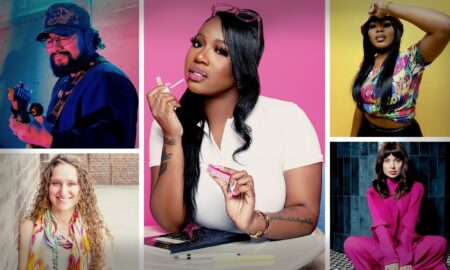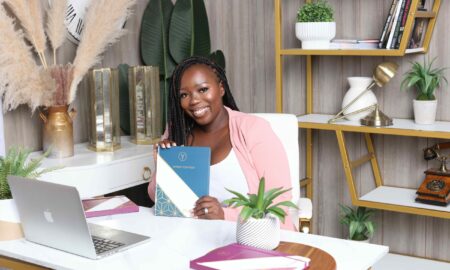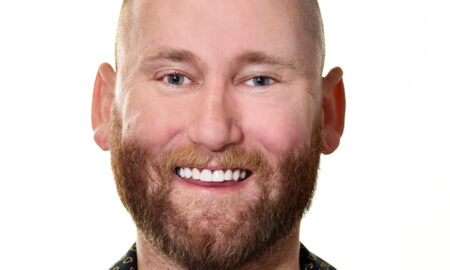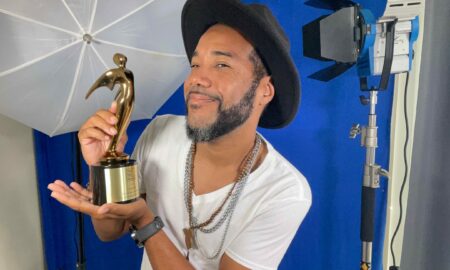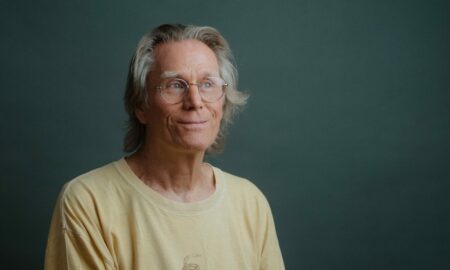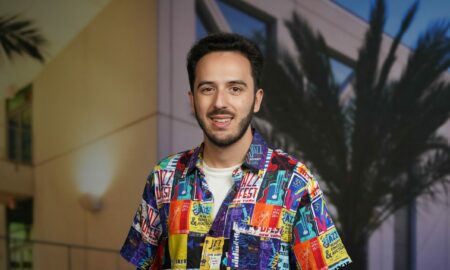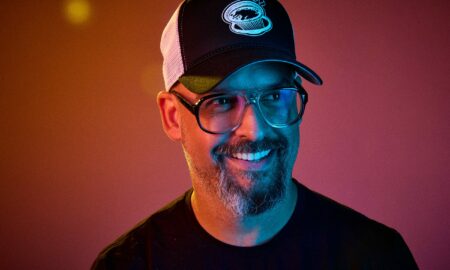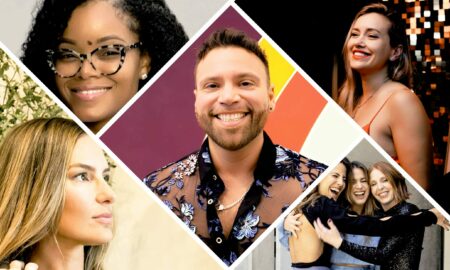

Today we’d like to introduce you to Pamela Hernandez.
Pamela, before we jump into specific questions about the business, why don’t you give us some details about you and your story.
After graduating from Florida State University with a B.A. in Mass Communications and English I completed a service year as an Americorps member for an educational non-profit – City Year Miami. During my service year, I was in the classroom serving as a reading interventionist in one of the lowest-performing schools in Dade-County. The need was so great in that first middle school that I found myself feeling overwhelmed and crying every day when I got home. The school was very underresourced. There was a lack of technology in classrooms and media centers. There was a lack of text-books and enriching curriculum materials. There was a lack of security guards, which the students took full advantage of and skipped class regularly, and found any excuses to get into brawls. However, the most frustrating issue was the lack of teachers, let alone highly effective educators. I was brought in to support the teacher in the classroom by conducting small groups during differentiated instruction centers. However, there was no teacher in the classroom for about five months. I was in a classroom with a substitute teacher day in and day out, trying to serve the different needs of the students in the class.
At 23 years old I became a teacher without any formal training or teaching background. It was that, or look at the failing faces of 30 students in a classroom. The only thing I knew about teaching was what I learned from my mother – who doesn’t have an education degree, but who has taught me everything I know. My mom always gave me speeches and long lectures about the hardships and triumphs of life. It is in this way that I approached the students in the class. We discussed the hardships they were facing in their personal lives and at school. Many of them were in school just because it was the only place to have a free meal. Others were in school because their other choice was a detention center. Some were part of local neighborhood gangs. At the age of twelve, some were selling and doing drugs.
It was at that moment, that I learned how important it is for all of us to check our own privilege. I didn’t grow up with a lot of money, my parents immigrated here from the Dominican Republic, my mom didn’t speak English, my parents don’t have a college degree, I didn’t have a lot of things growing up, but I had two parents who loved me and wanted the best for me and always instilled in me this drive and determination to go to school and get a career. This was not something that my first batch of students had in their lives, and I felt it my responsibility to give them as much inspiration and hope for a better future, as I could.
Halfway through my service year, I was compelled to start my Masters at FIU in a field called Urban Education. I started the program in hopes that I could learn something that would help my students, and that I could take back into the classroom and really make a difference. I learned a very important lesson during my first class in the Urban Education field. If students don’t like you, they are less likely to learn from you. Teaching students who live in urban areas or marginalized communities are so different than teaching kids who come from the wealthy suburban or rural areas. You can’t go into a school in Overtown, liberty city, Miami Gardens, Homestead, Goulds, and think that these kids are just going to respect you right from the jump. These kids are dealing with trauma from authoritative figures, and they see teachers are just another adult who doesn’t understand them and what they are going through and is demanding things of them without giving anything in return.
The highly effective teachers don’t want to teach in these communities or schools because they don’t know how to deal with this demographic of students. Teachers don’t understand that before any teaching and learning takes place, you have to meet these kids where they are. You have to show these kids you love them and you want what is best for them. You have something to prove to these kids before they give you their attention or respect.
It took me six months to build some bonds with those kids, and at first, I didn’t know how I would do it. I kept thinking back to those movies that we all have seen – Freedom Writers and Stand and Deliver, but this shit was hard. The only thing I kept thinking about was my mom, and how she used her words, speeches, and long talks about life to motivate me.
I had a lunch mentoring group and EVERY SINGLE DAY I sat with a group of kids and had lunch with them and just bonded and got to know them more. We talked about different things, and none of them having to do with school. Once the students saw that I was interested in them as people, it became much easier to teach them something in the classroom. They were more receptive at that point. Whenever I could I would go to their soccer games and show them that I cared and that I would be there for them. I went above and beyond what any teacher did for me in middle school or high school.
While I was taking classes in FIU for my masters I was learning more and more about social justice pedagogy and culturally relevant pedagogy. I was learning about education equity, and the role that education plays in the system of oppression, The more I learned about all the politics in education and how for centuries education – or the lack of education was used to keep some of us stupid and poor, I was enraged. I started to look at the classroom as a battlefield where I trained soldiers. I started looking at my students as change agents and started to have real talks with my students about why they were in this predicament in the first place. I wanted my students to be #WOKE. If they are aware that there is a system that is working against them, a system that wants to see them fail, if they understand that this system is designed to keep some people on the top and some people on the bottom, if they are able to understand that, then they are able to fight against it. I wanted my students to understand that the act of being a poor black, immigrant, girl, Latinx, queer, student and being able to read, write, do arithmetic, get into college, and VOTE, these are ways that we fight back – this is our way of rebelling and protesting.
After my first year in the classroom with City Year Miami, I promised that I wouldn’t stop trying to create change agents. I use the classroom as a platform to talk about social justice issues and create awareness for my students. I have been planting these seeds for several years now, and I have hope that in the years to come we will have a generation of young people who are ready to be the change this world needs.
For the past year, I’ve been using my Instagram to help new teachers succeed in the classroom, as well as giving educators tips on how to make the classroom space for social change agents to develop and grow. I want teachers who are working in these tough Miami neighborhoods to visit my page and find inspiration and something they can take back to their classrooms. I want these teachers to know that they aren’t alone. Launching a teacher mentoring business on social media platforms is something that is becoming very popular right now. I’ve seen a lot of teachers selling different resources online and lesson plans. However, I haven’t seen as many teacher influencers from Dade-County talking about our real struggles and challenges and how we as educators can help each other, and our kids. I want to use my social media platform to just be a voice for my teaching community and help our at-risk youth become everything that this hegemonic system doesn’t want them to become.
We’re always bombarded by how great it is to pursue your passion, etc – but we’ve spoken with enough people to know that it’s not always easy. Overall, would you say things have been easy for you?
This journey has not been an easy one at all. Starting with the fact that teachers are underpaid. Teachers do so much every day, in and outside of the classroom. We work over 50 hours a week, we grade papers and lesson plan at home. We spend our own money on school supplies and extra books and furniture for our classroom, and halfway through the year so many of us are burned out. As a teacher, we have to wear so many hats for some of our students: teacher, friend, mom, dad, counselor, etc. And then we have to go home and be there for our own families. Being a teacher is so rewarding, but so draining at the same time.
Another one of my personal challenges is not being understood by many of my colleagues. For example, in my class, we read James Baldwin, and have seminars about feminism, and we don’t stand up and pledge the flag, and this really bothers some of the people I work with because they don’t understand/agree with my agenda. They don’t think I should be talking to my students about racism, sexism, discrimination. Others don’t think it’s my job to discuss real-life issues with my students – let alone discuss politics, but TEACHING IS POLITICAL!
We’d love to hear more about your business.
I’ve been teaching for the past five years in Miami-Dade County. I am an English Language Arts teacher and I have my B.A. in Mass Communication and English and my M.S. degree in Urban Education. I am most known for being a social justice advocate teacher and infusing social justice within my given curriculum. One of the things that I am most proud of thus far as a teacher is creating, organizing, and hosting the Young Girls Rock Conference at my school. This was an event that spanned the course of a week. Every day we had a different seminar prepared for the girls who wanted to participate in the conference. For example, we discussed women in STEM, rape culture, consent, and women in politics. We also had a “period party” where we partnered up with a local organization Period Miami to openly discuss and normalize periods in our school. It was amazing seeing boys learning and asking questions about the menstrual cycle and I loved watching my female students openly share their period experiences with their male friends. This was such a game-changing moment for me as a woman and educator.
What were you like growing up?
When I was growing up I was always writing poetry and listening to alternative rock music. I loved reading poetry and young adult novels. I always wanted to be a lawyer because I wanted to help people, and defend people who were being treated unfairly. My uncle called me his “little lawyer” even to this day. I was very sassy and I’ve always been very extroverted and opinionated. I was very passionate and still am. When I believe in something or when I want something badly, I go HARD.
Contact Info:
- Email: phcruzcraftingandteaching@gmail.com
- Instagram: https://www.instagram.com/phcruz_crafting_and_teaching/
- Facebook: https://www.facebook.com/pamela.hernandez.75436?ref=bookmarks







Suggest a story: VoyageMIA is built on recommendations from the community; it’s how we uncover hidden gems, so if you or someone you know deserves recognition please let us know here.










